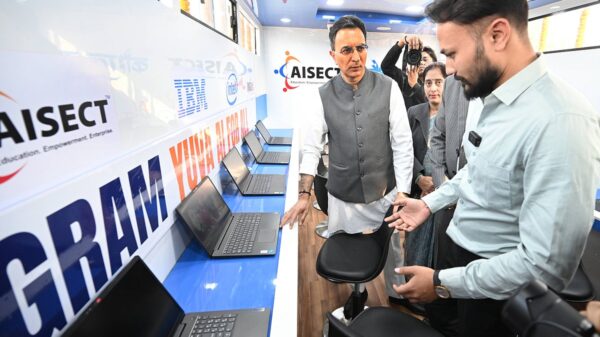In a notable development within the quantum computing sector, Rigetti Computing CEO Subodh Kulkarni executed a significant stock sale, netting approximately $11 million. This transaction occurred amidst a staggering 2,000% surge in the company”s stock price over the past year, which has captivated the attention of investors.
Kulkarni, who has led the company since December 2022, exercised options to acquire and subsequently sell around 5 million shares in late October. This move came shortly after a major increase in share value and just ahead of another expected rally, as analyzed in a report by The Motley Fool.
While insider stock sales are not uncommon, the timing and magnitude of Kulkarni”s sale have raised eyebrows in the industry. Quantum computing is still in its early stages, and companies like Rigetti are working on developing superconducting quantum processors. Despite the buzz surrounding the company”s Ankaa-3 and forthcoming Cepheus-1 systems, practical applications remain largely confined to research environments.
The sale took place when shares were valued at around $2.20, prompting questions regarding Rigetti”s long-term valuation potential, especially given its market capitalization has increased significantly despite modest revenues—reportedly $1.9 million for Q3 2025, which fell short of Wall Street expectations, as noted by Seeking Alpha.
While some analysts suggest that Kulkarni”s transaction is not inherently negative, as executives often sell shares for personal reasons, it has been described by Yahoo Finance as a cautionary signal amid the hype that often accompanies the quantum sector.
The broader quantum computing industry is familiar with volatility. Other companies such as IonQ Inc., D-Wave Quantum Inc., and Quantum Computing Inc. have witnessed insider sales totaling hundreds of millions, indicating a level of apprehension, according to separate analyses. Recently, Nvidia CEO Jensen Huang moderated expectations during a conference, asserting that practical quantum computing is “years away.” This prompted a sector-wide selloff that saw Rigetti shares decrease by 35.9%, as reported on X (formerly Twitter).
In its Q3 earnings call on November 10, 2025, Rigetti discussed its plans for 2026-2027, emphasizing its goal of achieving quantum advantage within three to five years and developing fault-tolerant systems in the longer term. Kulkarni remarked to Quantum Zeitgeist that the intersection of quantum computing and artificial intelligence is currently driving investor enthusiasm, but he emphasized the importance of maintaining a long-term focus despite market fluctuations.
Investor sentiment, particularly on social media platforms like X, has intensified discussions about Kulkarni”s recent statements and stock sales. User commentary, such as that from @commonsenseplay, has interpreted his earlier share sales as indicative of the company”s pre-revenue phase. Furthermore, posts from @KobeissiLetter highlighted ongoing talks between Rigetti and the U.S. government regarding quantum funding, which has led to temporary stock surges but also underlined the company”s reliance on external financial support.
Wall Street”s perspective is mixed, with a Simply Wall St analysis indicating that Rigetti”s valuation has seen a 25% decline over the past month, in contrast to a 65% increase year-to-date. Analysts from 24/7 Wall St. have expressed concerns regarding potential overvaluation, suggesting that the company”s current valuation is at an unsustainable 500 times its sales.
Despite these challenges, Rigetti is making strides in expanding its global presence and currently holds a robust cash position of $558.9 million, according to its latest earnings report. The company experienced a non-GAAP net loss of $10.7 million, or $0.03 per share, a figure that managed to exceed some expectations. In a CNBC interview referenced by @moneymoverscnbc, Kulkarni stated, “If you are willing to think long term, if you are willing to think big picture, quantum computing is the game for you.”
Nevertheless, hurdles remain, as highlighted by a Citron Research post criticizing Rigetti”s failure to progress in DARPA”s Phase B, labeling it a “structural problem” related to error correction. This sentiment aligns with broader industry challenges, as Bill Gates remarked on social media that practical quantum computing lies three to five years ahead, contrasting Huang”s more cautious outlook.
Looking ahead, Rigetti”s roadmap aims for quantum advantage—surpassing classical computers in specific tasks—by 2028-2030. Collaborative efforts, including potential government funding amid ongoing U.S.-China technological tensions, could strengthen its competitive position. However, as Yahoo Finance reported last month, cumulative insider sales across quantum firms have reached $875 million, underscoring the need for investor vigilance. Kulkarni”s recent stock sale serves as a reminder of the disparity between the promise of quantum technology and its current profitability. With the company making progress with systems like Ankaa-3, the existing hype cycle necessitates careful scrutiny. As one user on X advised, “If you made money off of $RGTI, it”s time to GTFO,” highlighting the delicate balance between innovation and investment risk.
Ultimately, Rigetti”s narrative reflects the broader evolution within the quantum computing landscape. Founded in 2013 by Chad Rigetti, the company went public via SPAC in 2022, navigating the ensuing volatility with recent expansion efforts, including new facilities aimed at enhancing qubit counts, which are essential for practical applications in fields such as drug discovery and cryptography. However, as detailed by Stock Analysis, Rigetti”s stock price fluctuations and key financial metrics indicate ongoing uncertainty. As such, Kulkarni”s $11 million stock sale—whether a strategic move or not—serves as a cautionary note that in the realm of quantum computing, today”s rise could swiftly turn into tomorrow”s decline, necessitating a long-term investment strategy from stakeholders.
See also Investors Must Adapt to New Multipolar World Dynamics
Investors Must Adapt to New Multipolar World Dynamics Doubts Rise Over Viability of AI as Hype Cycle Peaks
Doubts Rise Over Viability of AI as Hype Cycle Peaks Amazon Partners with OpenAI to Enhance AI Capabilities and Cloud Services
Amazon Partners with OpenAI to Enhance AI Capabilities and Cloud Services Needham & Company Lowers Absci Price Target to $7.00 Amid Analyst Ratings Shift
Needham & Company Lowers Absci Price Target to $7.00 Amid Analyst Ratings Shift Eli Lilly CEO Utilizes AI to Enhance Meeting Efficiency
Eli Lilly CEO Utilizes AI to Enhance Meeting Efficiency

































































